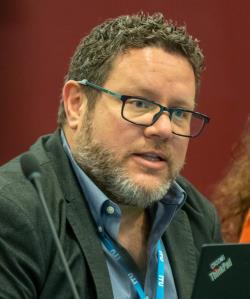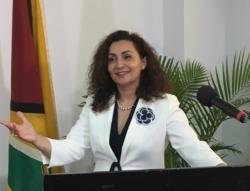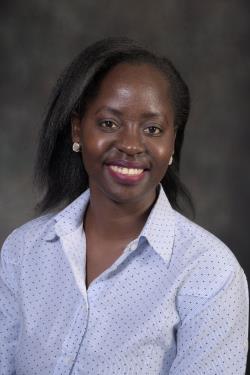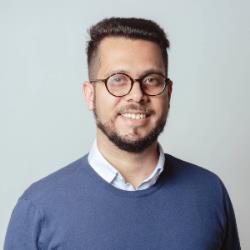Building an Enabling Environment for Indigenous, Rural and Remote Connectivity
Association for Progressive Communications, Rhizomatica and ITU-D Digital Inclusion
Session 474
The panel will analyze and share the experiences of indigenous communicators and community networks about the actions taken in different countries and contexts by diverse stakeholders, including policy makers and regulators, to create an enabling environment that have allowed them to manage and operate their own technological and communication projects. It will also go through challenges that face some communities towards accessible and equitable conditions for inclusive connectivity and the role that governments and non-governmental stakeholders should play to address them. The participants, in preparation for the WSIS+20 Review, will also reflect on new challenges facing indigenous and rural communities when incorporating their realities to the information society.

Carlos holds a PhD and Master's degree in Sociology from the Institute of Social Sciences and Humanities "Alfonso Vélez Pliego" of the BUAP and a Bachelor's degree in Communication Sciences from the UDLAP.
For more than 10 years he has been coordinating actions related to research, training and capacity building in the NGOs REDES AC and Rhizomatica, particularly through the Techio Comunitario training programme. As part of these functions, since 2019, he manages the "Training Programme on ICT Networks Management in Indigenous and Rural Communities in Latin America" as an ITU expert consultant; and, since 2020, he coordinates the Learning and Mentorship Area as part of the LocNet initiative in Asia, Latin America and Africa.
He has been an advisor for capacity building projects on technological and communication issues in community contexts and consultant for the development of connectivity strategies and access to telecommunications in rural and indigenous territories. In his link with academia and research, between 2019 and 2022 he was founder and general coordinator of CITSAC; in addition to being a member of the National System of Researchers (SNI) Level 1 of CONACyT of Mexico since August 2019.

Roxana WIDMER-ILIESCU has worked for the International Telecommunication Union (ITU) for the past 25 years, contributing to the overarching goal of Digital Inclusion by focusing on people with specific needs or in vulnerable situations such as women and girls, children and youth, persons with disabilities, older persons, and Indigenous people.
Since 2005, as ITU Focal Point for Indigenous Issues, Ms. Widmer has collaborated with experts and Indigenous Communities to develop and deliver dedicated knowledge development programmes aimed at empowering Indigenous People and communities through ICTs and supporting the socio-economic development and self-sustainability of these communities in accordance with their values, needs, and cultural heritage.
To ensure an all-inclusive and intersectional approach to the work in digital inclusion, she promotes Information and Communication Technologies ICTs/ digital accessibility, the universal design of technology, as a critical enabler to guarantee everyone's empowerment through access to and use of ICTs and equal and equitable inclusion in digital societies, economies and environments regardless of their age, gender, physical ability to use the technology, level of education or geographical location.
As Senior Coordinator for Digital Inclusion, she provides ITU members with specialized advice on developing digitally inclusive policies and strategies, and she leads the development of key ITU-D tools and resources intended to support stakeholders' efforts in the implementation of related regional and global commitments and in building a digitally inclusive world for all, ensuring that no one is left behind in the digital age.

She is a digital transformation expert with a passion for fostering collaborative and inclusive approaches to advance comprehensive digital inclusion and equity in Africa. As a pioneer in the community networks movement on the continent, she played a key role in establishing TunapandaNET, the first community network in Kenya. With her telecommunications engineering expertise, she focus on operational aspects of bottom-up connectivity and digital inclusion models, as well as telecom policy and regulations. She actively contribute to research, capacity building, and advocacy for policies and regulations on a global, regional, and local scale, all aimed at nurturing inclusive and people-centered digital ecosystems. She is currently serving as the Regional Policy Coordinator - Africa for the Association for Progressive Communications Local Access Networks Initiative, she also co-chair the Africa Community Networks Summit and is a member of the UN Internet Governance Forum Multistakeholder Advisory Group.

With over 23 years of extensive experience as a civil servant in various ministries of the Government of India (GOI), Mr. Sushil Pal currently serves as the Joint Secretary in the Ministry of Electronics and Information Technology. He is primarily responsible for execution of various Electronics Manufacturing Schemes, e.g. Semiconductors, PLIs (Mobile & IT Hardware), SPECS (Components), Investment Promotion activities etc. Besides, he is also in-Charge of International Co-operation Division, Internet Governance Division. Mr. Sushil Pal is the Indian Representative in the Governmental Advisory Committee of ICANN. He has played a pivotal role in leading the G20 Digital Public Infrastructure (DPI) initiatives & FTA negotiations on Digital Trade.
He has extensive experience working on programs and finance verticals of various sectors such as Ministry of Home Affairs, Economic sectors (Department of Fertilizers), Social sectors (Health) as well as Revenue Department of Government of India. He has also worked in multi-cultural environment and developing countries, particularly in Timor-Leste, having worked there as Treasury Advisor in Government of Timor-Leste. He has conceived and successfully implemented the computerization of receipt accounts of Direct Taxes across the country by leveraging the banking interface. As a National level Consultant for WHO and DFID, he provided technical assistance for formulation and implementation of financial and accounting guidelines for National Rural Health Mission (NRHM), a flagship scheme of Government of India.
He holds an MBA (Finance) from Faculty of Management Studies (FMS), Delhi University and a Postgraduate in Operational Research from Delhi University. He is also a Certified Internal System Auditor (CISA) qualified as awarded by ISACA, USA.

Dawit Bekele is a Regional Vice President for Africa at the Internet Society.
He has more than two decades of experience in Internet development in Africa and around the world. At the Internet Society, he has worked in various positions to support Africa around Internet policy and technology. Before joining the Internet Society in 2006, he worked at Addis Ababa University as an assistant professor. He also has extensive experience as a consultant for major international organizations and in the private sector.
He received his undergraduate, Masters, and Ph.D. degrees from Université Paul Sabatier in France, all in Computer Science. He also holds a Masters in Business Leadership from the University of South Africa.
He is an Ethiopian citizen living in Geneva.

Public policy director at Derechos Digitales. Bachelor of Law by State University of Maringá (UEM), PhD and MA of Law by the University of São Paulo (USP), LL.M. of Comparative Law and Economics by the International University College of Turin (IUC).
-
 C2. Information and communication infrastructure
C2. Information and communication infrastructure
-
 C4. Capacity building
C4. Capacity building
-
 C6. Enabling environment
C6. Enabling environment
-
 C8. Cultural diversity and identity, linguistic diversity and local content
C8. Cultural diversity and identity, linguistic diversity and local content
C2: Through the local communication initiatives of the indigenous and rural communities it is possible to generate sustainable infrastructure solutions in the last mile, since it is the organizations themselves who take charge of it.
C4: By participating in these type of projects, community leaders and communicators gain skills that are socialized in their territories and generate local training processes. Ultimately, this translates into digital literacy actions and access to ICTs for people with very different characteristics who live in rural and indigenous territories.
C6: Various stakeholders participate in the design and implementation of these projects, as they are developed collectively. This gradually contributes to generate the necessary linkage and advocacy instances for the creation and consolidation of these local initiatives for meaningful access and the training programmes that support them.
C8: These local digital communication initiatives are based on cultural diversity and respond to it through their ways of life. Also, the technology is understood from the needs of the communities and it adapts to them. Furthermore, the projects developed by the participants are closely linked to the production of local content. Finally, the diversity in these programmes is a consequence of the diversity of the communities themselves, more women are participating in the technical training programmes and people of very different ages have been included.
-
 Goal 1: End poverty in all its forms everywhere
Goal 1: End poverty in all its forms everywhere
-
 Goal 4: Ensure inclusive and equitable quality education and promote lifelong learning opportunities for all
Goal 4: Ensure inclusive and equitable quality education and promote lifelong learning opportunities for all
-
 Goal 5: Achieve gender equality and empower all women and girls
Goal 5: Achieve gender equality and empower all women and girls
-
 Goal 8: Promote inclusive and sustainable economic growth, employment and decent work for all
Goal 8: Promote inclusive and sustainable economic growth, employment and decent work for all
-
 Goal 9: Build resilient infrastructure, promote sustainable industrialization and foster innovation
Goal 9: Build resilient infrastructure, promote sustainable industrialization and foster innovation
-
 Goal 10: Reduce inequality within and among countries
Goal 10: Reduce inequality within and among countries
-
 Goal 16: Promote just, peaceful and inclusive societies
Goal 16: Promote just, peaceful and inclusive societies
-
 Goal 17: Revitalize the global partnership for sustainable development
Goal 17: Revitalize the global partnership for sustainable development